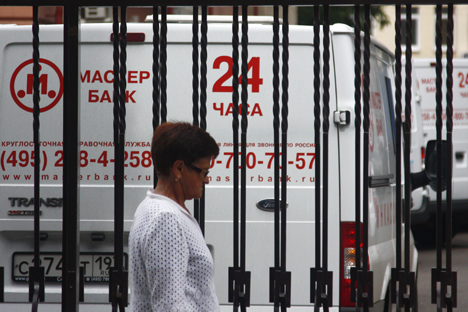
According to investigators, the group cashed about $1.1 billion in Moscow and other regions, over the course of more than five years. Source: RIA Novosti
Russian law-enforcement agencies have caught a large, underground group of bankers engaged in illegal cash conversions, the Ministry of Internal Affairs’ press service announced. The police have identified the group’s members and hierarchy, as well as the schemes it used to cash the money.
According to two law-enforcement sources and a bank employee, 42-year-old Mytischi native Sergei Magin is the group’s leader.
More than 400 people and over 100 Russian and foreign firms were involved in the illegal activities, the Ministry of Internal Affairs reported, without naming the person who organized everything.
The core of the gang consisted of seven people who, among other things, held different positions at banks, a spokesperson for the ministry’s Main Division for Economic Security and Countering Corruption said. According to two police officers, investigators are planning to ask the court for an arrest warrant for all seven.
According to investigators, the group cashed more than 36 billion rubles (about $1.1 billion) in Moscow and other regions, over the course of more than five years.
A spokesperson for the Ministry of Internal Affairs described the scheme as follows: Proceeds from customers were transferred into accounts of phony companies that were opened in banks under the group’s control; the money was then cashed or sent to accounts in the Baltic states or in Cyprus.
The group members legalized the cash by purchasing real estate. The suspects charged a commission fee of 2 percent for their services. According to preliminary estimates at the Ministry of Internal Affairs, they made 575 million rubles (around $17.4 million) in illegal proceeds.
The key banks involved in the scheme reportedly included Master Bank, Military and Industrial Bank, Oksky, Intercapital, and Aspekt. The Military and Industrial Bank said in a press release that law-enforcement agencies collected information on several individuals and legal entities at its head office on July 5, but had not accused the bank of any wrongdoing.
According to SPARK-Interfax, Magin has owned or managed several dozen small firms over the years. He is now the owner of 12 companies and head of the Panorama Homeowners’ Association. In general, the banks are either owned by private individuals, or they refused to disclose their owners.
“There could be more banks, but these are the main ones,” Vedomosti’s sources said. One of the investigators said Master Bank (the 75th largest in Russia in terms of assets, with 43.6 billion rubles in private deposits) is being investigated.
Another source told Vedomosti thatit is not the bank itself that is under suspicion, but an armored vehicle owned by it that was used to transport cash laundered by the gang. The vehicle carrying cash was seized during a sting operation; Master Bank is being investigated for possible involvement in cashing transactions, the source said.
“No searches were conducted at Master Bank, nor were there any accusations from law enforcement,” Olga Bocharova, the bank’s spokesperson, said. Master Bank provides cash collection services to the Military and Industrial Bank and is ready to provide investigators with all the required documentation, she added.
Searches of banks and 85 suspects’ homes were conducted on July 7, and documents were seized. More than 1 billion rubles (about $30 million) in cash was seized, in addition to financial documents and more than 500 stamps of Russian and foreign legal entities, the Ministry of Internal Affairs said.
According to a representative of the Main Division for Economic Security and Countering Corruption, a criminal case was opened under Criminal Code articles 172 (“Illegal Banking”) and 210 (“Organizing or Participating in a Criminal Group”).
Whereas the former article is often used in such investigations and carries a relatively light punishment (up to seven years in prison plus a fine of up to five years’ income), article 210 carries between 15 years to life in prison for organizers and leaders of a criminal group. Rank-and-file gang members face 5-10 years behind bars.
Article 210 is very rarely used in such cases, Viktoria Burkovskaya, an associate at the Egorov, Puginsky, Afanasiev & Partners law firm confirmed.
Russian officials will spend by the rules
Russia might adopt Foreign Account Compliance Tax Act in 2014
According to her, it needs to be proven that a criminal group was stable during a long period of time, had an internal hierarchy, and, most importantly, was established with the intent to commit crimes.
Some $49 billion was transferred out of Russia illegally in 2012, former Central Bank head Sergei Ignatyev admitted in an interview with Vedomosti; the bulk of the money was siphoned via phony companies.
Ignatyev has raised the need to intensify the fight against money laundering several times in public remarks since the beginning of this year: “We transmit all information on suspicious transactions to the tax service and law-enforcement agencies and wait for their response.”
As State Duma deputy Anatoly Aksakov notes, Ignatyev’s appeals have finally reached critical mass, apparently, triggering a serious fight against criminal banks.
First published in Russian in Vedomosti
All rights reserved by Rossiyskaya Gazeta.
Subscribe
to our newsletter!
Get the week's best stories straight to your inbox